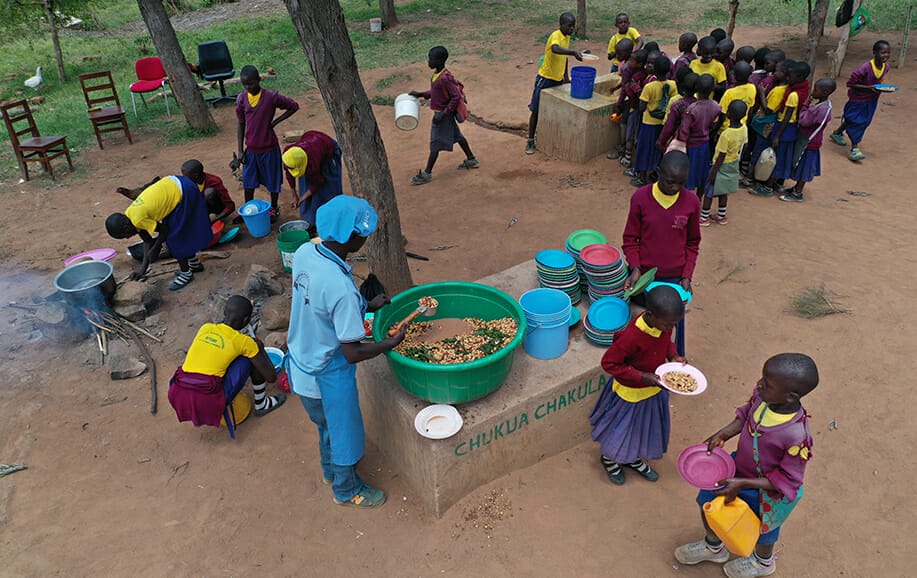News > Blog
Strengthening School Feeding Systems in Tanzania
Published 05/27/2021 by Global Communities

For the past 10 years, PCI, a Global Communities Partner, has implemented integrated school feeding programs that help deliver essential nutrition, education, health and development services to more than 240,000 preschool and primary students in the Mara Region of Tanzania. With funding from the U.S. Department of Agriculture (USDA) and support from stakeholders across multiple sectors — including the Government of Tanzania (GoT) ministries at all levels — these programs have developed technical strategies and best practices on community-led school feeding projects that now serve as a model for replication. PCI is currently implementing both the USDA McGovern-Dole International Food for Education and Child Nutrition program, called FFE III, in 231 primary schools, and the USDA Local and Regional Food Aid Procurement program, called Chakula Chetu (“Our Harvest” in Swahili), in 16 primary schools in Tanzania.
A Model for Nationwide Scale
Given the success of PCI’s school feeding projects in the Mara Region, the GoT requested PCI’s support to develop the country’s first National School Feeding Guideline (NSFG) and scale PCI’s current model across all 20,000 public and private schools in Tanzania. PCI served as the ministries’ key technical partner during a thorough and consultative process, which included Tanzania’s Ministry of Education, Science and Technology (MoEST), the Ministry of Health, Community Development, Gender, Elders and Children, and other stakeholders, development partners and technical specialists.
Representatives from various GoT ministries visited existing school feeding programs in seven regions, including PCI-supported schools in the Mara Region, to collect data and conduct interviews, focus group discussions and surveys to inform the design of the NSFG. In October 2018, the MoEST and PCI hosted a coordination meeting to exchange best practices and learn from key partners and stakeholders nationwide.
“The Government of Tanzania understands that the NSFG documents are in line with the UN Rights of the Child under Article Four on the protection of rights,” said Dr. Lyabwene Manyirika Mutahabwa, MoEST Commissioner for Education. “As for the government, we will ensure an environment where children can learn, grow healthily and reach their full potential.”
Through PCI’s focus on enhanced local production and mobilization of community contributions, FFE III and Chakula Chetu strengthened the capacity of schools and communities to build self-reliance and gradually take responsibility to manage and sustain school feeding. This has led to better learning environments and improvements in students’ attendance, concentration, literacy skills, nutritional status and overall academic performance. These innovative programs have also equipped schools to manage food storage, train and mentor school administrators to supervise school feeding appropriately, engage local government structures to support and monitor school feeding, and mobilize communities to own and contribute to their school feeding programs.
For example, the community surrounding Sanzate Primary School was reluctant to contribute food to schools when PCI first introduced the school feeding program there in 2011. However, after engaging parents, farmer groups and women’s savings groups on program sustainability and ways to plan and coordinate their efforts, community contributions began to increase and the partnership between the school and community strengthened. By the time U.S.-donated commodities phased out in 2020, Sanzate Primary School was able to take full ownership of the provision of daily school meals through contributions from parents and community members and harvests from school gardens and farms.
“If the community, school and village government all work together as a team, the success must be realized,” said a village chairperson in Sanzate.
Launching Tanzania’s First National School Feeding Guideline
In March 2021, the MoEST approved the NSFG, which is now ready to be launched nationwide. The NSFG provides uniform guidance for schools, communities and the local government to develop, coordinate and oversee school feeding programs. Key components of the NFSG include:
- The importance of school meals;
- School management of the school feeding program;
- Responsibilities of various actors such as government officials, school administrators, teachers and community members;
- Mobilization for community ownership and local contributions; and
- Use of the data management system.
“The National School Feeding Guideline is timely and vital,” said Dr. Paulina Mkonongo, director of basic education at the MoEST. “It is tailored to accommodate locally available food produced across the country and is structured to reflect our context. This guide provides room for implementers to adapt and operationalize the school feeding efforts in any particular environment in Tanzania.”
Developing a Regional School Feeding Strategy
In 2020, using PCI’s projects as a model, the Mara Regional Administration began the process of developing its Mara Regional School Feeding Strategy (MRSFS) and requested PCI to serve as its key technical partner in supporting the development and operationalization of the strategy. In February 2021, the MRSFS was approved and will guide the rollout of school feeding programs in all eight districts of the Mara Region. The Mara Region is the first region in Tanzania to have its own school feeding strategy, and Mara Regional leadership is committed to developing school feeding programs similar to FFE III and Chakula Chetu into a sustainably integrated part of their regional strategy.
“With or without PCI, school feeding programs in the Mara Region must continue to be implemented, and it will be our main agenda,” said Adam Malima, Mara Regional Commissioner.
Supporting Rollout and Replication
The development of Tanzania’s first NSFG and regional school feeding strategy represents a historical step in the country’s journey to achieving a National School Feeding Program. PCI will support the President’s Office, Regional and Local Government to plan and execute national rollout of the NSFG and carry out operational guidance under the MRSFS to replicate quality and locally-owned school feeding programs nationwide, thus ensuring schools continue to benefit even after PCI and USDA support ceases.




